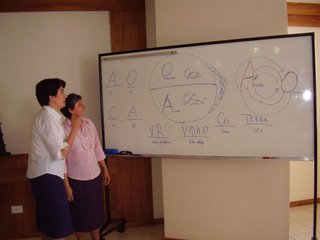Living Our Personal Christian Vocation

The Vocation: Anthropological and Biblical foundation
 Fr. Garcia Rubio presented to us the prospective of an integrated Christian anthropology. His point of departure is elaborated in the following conviction and experience:
Fr. Garcia Rubio presented to us the prospective of an integrated Christian anthropology. His point of departure is elaborated in the following conviction and experience:Every human being is called to welcome and develop the constitutive richness of her being person, which is her personal vocation received from God. To assume and live it means to be herself, this is the first and fundamental vocation of every human being.
It is more important to allow ourselves be loved than to love. Only on receiving the love of God are we capable of loving.
 The human person is rather complex. When one does not succeed to integrate the distinct dimensions of herself, it is easy that one almost suppresses one dimension in order that another grow or develop, for this motive includes the continuous temptation that we have to fall into a dualist reductionism. The dualist vision, assumed by the Fathers of the Church, from neoplatonism and stoicism, has left wounds in the church, but it was also a product of the culture of time. So, for example, we see how the spiritual dimension was excessively stressed in comparison with the physical or bodily dimension, the importance of reason to the detriment of emotions; by desire for heavenly life depreciating earthly life, and as a result esteemed religious life greatly with respect to that of the world.
The human person is rather complex. When one does not succeed to integrate the distinct dimensions of herself, it is easy that one almost suppresses one dimension in order that another grow or develop, for this motive includes the continuous temptation that we have to fall into a dualist reductionism. The dualist vision, assumed by the Fathers of the Church, from neoplatonism and stoicism, has left wounds in the church, but it was also a product of the culture of time. So, for example, we see how the spiritual dimension was excessively stressed in comparison with the physical or bodily dimension, the importance of reason to the detriment of emotions; by desire for heavenly life depreciating earthly life, and as a result esteemed religious life greatly with respect to that of the world.
In postmodern time, these realities or dimensions are reversed but dualism tends to continue. Currently, there exists another type of persons who feel the need of spirituality as much as that of activity, but did not succeed in integrating the two realities.
To have integrated programs for pastoral vocations, we have to seek to be integral persons who live with openness to God, to others and to the reality of today.
 Meeting of the two rivers of the Amazon: Rio Negro and the Solimoes.
Meeting of the two rivers of the Amazon: Rio Negro and the Solimoes.An example of integration?

0 Comments:
Post a Comment
<< Home